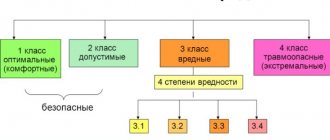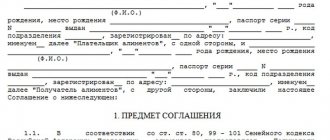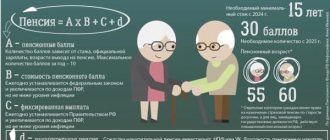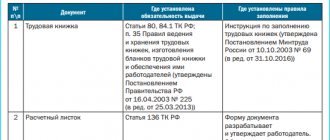Preferential pension
A preferential (early) pension is a monthly cash payment that can be paid to a person who has not reached the generally established retirement age, but has a legally defined work experience in a specific specialty or a certain social status.
To grant early pensions, certain requirements must be met:
— Professional activity.
A person has the right to early retirement if he works in dangerous or difficult conditions and his work may pose a particular danger to health and life.
— Special territorial conditions.
Citizens who work in the Far North or other territories that are traditionally equated with them will retire early.
— Social requirements.
The right to early pension provision under the law is granted to people who have a certain social status.
These include mothers with many children, parents and guardians of people with disabilities since childhood, residents of the Far North who lead a traditional lifestyle, people with disabilities, and dwarfs. Early retirement requires the fulfillment of a number of conditions:
— Age.
Russian legislation, in contrast to the practice used in other countries, establishes a differentiated retirement age for men (60 years, in the future - 65 years) and women (55 years, in the future -63 years). Representatives of certain professions and categories of citizens have the right to receive pensions of previously specified values.
— Insurance experience.
A certain number of years, established by law, during which insurance premiums were to be deducted from the employee’s earnings by the employer. Also, other socially significant so-called non-insurance periods are counted in the insurance period: military service; care of one parent for children until they reach the age of one and a half years; care for disabled children, group 1 disabled people, 80-year-old citizens; periods of receiving unemployment benefits, etc.
In 2021, the minimum insurance period is 9 years.
— Seniority.
The time during which a person worked under an employment or civil contract
The length of service takes into account the time spent in military service, being on sick leave, the period of being registered with the Employment Service, parental leave until the child reaches the age of one and a half years, etc.
Special length of service - length of service in certain professions and positions, which is necessary for the appointment of an early pension
— Individual pension coefficient.
A value that directly affects the amount of the assigned pension. When transferring insurance contributions to the Pension Fund, the amount of money is converted into points according to a special formula, which, upon retirement, are summed up and then multiplied by the cost of the IPC (the value is indexed annually).
Procedure and rules for registering disability due to health
The procedure is divided into several stages. If the patient is bedridden, to register the disability you will need a notarized power of attorney for the representative. Registration procedure:
- A citizen undergoes a medical examination in a hospital.
- Registration with the ITU Bureau. The pensioner fills out an application and attaches documents along with copies. The originals are registered, verified, and then returned to the applicant.
- Setting a date for passing the ITU. The examination can be carried out in a month or six months. The date of completion depends on how busy the bureau commission is.
- Passing the ITU . On the appointed day, the citizen comes to the bureau. Bedridden patients undergo MSA at home or in the hospital (with preliminary hospitalization for a couple of days).
- Obtaining examination results.
What documents are needed
To undergo a medical examination you will need:
- passport;
- referral to ITU;
- survey results;
- patient's outpatient card received against signature;
- employment history;
- characteristics from the last place of work;
- act of injury at work or occupational disease (if health problems arose due to work).
Referral to ITU
The registration procedure begins with a visit to the attending physician. The specialist issues a referral for tests and prepares medical documents for medical examination. The research results are sent to the hospital commission. After its approval, the patient is given a referral for medical examination. The mailing list states:
- data on the patient’s health status;
- past illnesses (heart attack, stroke, cancer, etc.);
- test results;
- necessary rehabilitation equipment (stroller, hearing aid, etc.)
Medical and social commission for disability
The ITU date is determined by the citizen’s health. In case of temporary incapacity without the possibility of improving the patient’s condition, an examination is carried out after 4-5 months. If the prognosis is favorable, the ITU will be appointed 10 months after submitting the application. In case of a rapidly progressing disease, the examination is carried out within 1 month. The medical and social commission includes 3 doctors:
- Clinical pharmacologist.
- 2 medical specialists (profile depends on the nature of the disease or injury) with higher medical education.
The chairman of the commission is the head of a medical organization or one of his deputies with a higher medical education. The procedure for conducting the examination:
- Citizen survey. His physical condition is being assessed.
- Study of submitted documents.
- Analysis of social and everyday skills. The patient is asked questions and his behavior is assessed. An employed citizen submits a reference from his place of work to the ITU for examination. The document is needed to establish the degree of disability. The boss can indicate in the characterization deviations in behavior that appeared after receiving an injury or that the citizen has always had.
- Making a decision by voting.
Expert opinion on group assignment
The commission can assign or deny disability to a citizen. In both cases, a conclusion is issued. When a group is assigned, the patient is given a certificate of disability and an individual rehabilitation program (IPRA). The latest document states:
- rehabilitation means;
- drugs to restore health;
- types of sanatorium-resort treatment necessary for a disabled person.
- Pensioners who are entitled to compensation and benefits for travel
- Payments to pensioners born in 1953-1967 - amount and how to receive
- How to weave bow bracelets from rubber bands
Disability is established indefinitely or for a certain period. In the conclusion, indicate the time of passing the commission to confirm the status. When the document expires, the status is canceled. To restore it, you need to go through the ITU again. In case of lifelong disability, re-examination is not necessary. This is also indicated in the document. Standard frequency of re-examination:
- disabled people of group 1 every 2 years;
- disabled people of 2-3 groups annually.
Diseases for which permanent disability is recognized:
- oncology in the last stages;
- complete deafness and blindness;
- paired hip amputation;
- diabetes mellitus with many functional disorders;
- schizophrenia;
- epilepsy with severe mental disorders, etc.
Social categories of citizens
Today, groups of the population that have the right to take early retirement are legally defined, and in this case, not their work experience (work in harmful or difficult working conditions) is taken into account, but their social status in society: mothers of many children; guardians or one of the parents of disabled children or people with disabilities since childhood; some categories of unemployed; representatives of small indigenous peoples of the Far North engaged in subsistence farming; midgets; disproportionate dwarfs; visually impaired people of group 1; persons who have become disabled due to military trauma; mothers of 2 or more children who worked in the Far North.
Preferential professions
The list of preferential specialties is an approved list of professions that are entitled to certain preferences.
The basis for their compilation is the level of exposure to the body of harmful factors that arise during the production process.
There are List No. 1 and List No. 2. They were approved in 1991 by resolution of the USSR Cabinet of Ministers No. 10 to determine the professions of people who have the right to retire early. The procedure for applying the Lists at the present stage is established by Decree of the Government of the Russian Federation No. 665 of July 16, 2014, in accordance with the provisions of Article 30 of Federal Law No. 400-FZ “On Insurance Pensions”.
According to the Labor Code, citizens whose work activities are carried out in hazardous conditions (according to the SOUT) have the right to additional leave, reduced working hours and other privileges.
Who is entitled to early retirement for health reasons?
Not all citizens who are unable to perform work duties due to illness are eligible for early retirement. The health complication must be documented. Sickness pension is possible only after disability has been established. You can get it for the following reasons:
- diseases;
- mutilation;
- man-made disasters;
- injuries received while performing military duties.
- Russians flying from abroad were required to register for their flight on the State Services portal
- Who is entitled to receive a double pension?
- 11 signs of lack of protein in the body
The impact of unfavorable production factors on health gives citizens the right to receive pension payments ahead of schedule. According to Law No. 400-FZ “On Insurance Pensions”, persons who:
- work in hazardous industries;
- work in professions associated with hazardous working conditions.
Lists No. 1 and No. 2
The difference lies in the degree of harmful influence of production factors on the human body:
List No. 1 - especially dangerous and difficult conditions;
List No. 2 - harmful and difficult conditions (less hazardous to health compared to List No. 1).
In short, work in professions, positions and industries defined by both Lists gives a citizen the right to preferential pensions.
Among the professions and positions we should highlight: nuclear energy workers; chemical industry workers; geological prospectors, search engines; miners; persons working at underground facilities and structures; civil aviation flight personnel; persons employed in urban passenger transport; workers involved in work with radioactive substances; women who worked as tractor drivers in agriculture or on loading and unloading machines; persons who worked in hot areas of work; doctors and nursing staff; metallurgical workers; railway transport workers; teachers; persons with particularly difficult working conditions; aviation industry workers; crew members on ships of the sea, river and fishing industry fleets; correctional officers; emergency services workers; creative workers.
Provided that a person’s work activity is associated with dangerous, harmful or difficult working conditions, which relate to List No. 1 and List No. 2, he may qualify for early retirement even if he has worked at least half the time required for early retirement in connection with work on these Lists.
In order to take advantage of this prerogative, you must additionally have the required amount of pension points and a certain insurance period.
Some categories of citizens who do not work in dangerous and harmful working conditions can also receive early old-age payments.
The size of the insurance pension depends on the citizen’s labor contribution - his length of service, earnings, and the amount of insurance contributions paid to the Pension Fund.
Reasons for appointment
Early retirement for health reasons is possible if a number of conditions are met. Pension provision may be assigned to a citizen if he meets the following requirements:
- has a conclusion on recognition of disability indicating the group, which is issued by a medical and social examination (MES);
- have at least one day of work experience available;
- During this period of work, the employer paid insurance contributions to the Pension Fund.
The duration of the MES conclusion depends on the disease and the established group. At the end of the period, you must undergo a new examination. When health improves, disability is canceled and pension payments are terminated. The validity period of the certificate depends on the disability group:
- 2, 3 group – year;
- first - two, in severe conditions - indefinitely.
- Imodium - instructions for use
- How to get rid of midges in the kitchen
- 16 foods that boost immunity
Decree of the Government of the Russian Federation No. 95 of February 20, 2006 “On the procedure and conditions for recognizing a person as disabled” established a list of diseases that give the right to receive disability. Early retirement is possible in the following cases:
| Pathologies | Diseases |
| Internal organs |
|
| Neuropsychiatric |
|
| Surgical |
|
| Ear, nose, throat |
|
| Organs of vision |
|
| Anatomical defects |
|
Mothers of many children
For those women who gave birth and raised five or more children before reaching the age of 8 years, the state guarantees the opportunity to retire earlier than expected.
To do this, you must reach the age of 50 and have an insurance period of at least 15 years, which, in addition to work, can include other non-insurance periods, including childcare for children up to one and a half years old, but in total no more than 6 years. It is also necessary to have the required IPC value. Those women who do not meet the above criteria are awarded an insurance pension on a general basis or a social pension.
The only exceptions are those who gave birth to two or more children, but worked in the North.
To retire, they must reach their 50th birthday. Their total insurance experience must be at least 20 years, of which they must work 12 years in the Far North or 17 years in areas equivalent to such territories.
Disabled people and their guardians
If a family has a disabled child or has been disabled since childhood, one of the parents has the right to early retirement, but subject to two conditions: reaching the 55th birthday and having 20 years of insurance experience for men;
reaching the 50th birthday and 15 years of insurance experience for women. Citizens who are guardians of disabled people from childhood or who were guardians of disabled people from childhood who raised them until they reached the age of 8 years, an old-age insurance pension is assigned with a reduction in the generally established retirement age by one year for every one year and six months of guardianship, but not more than five years in total if they have an insurance period of at least 20 and 15 years, respectively, men and women.
Health status
When assigned disability group 1, 2 or 3, a person has the right to receive pension payments. When applying for a pension, it is not taken into account whether the disabled person is currently working or not. The only condition that is necessary for assigning an insurance pension is the presence of an insurance period, and its duration does not matter.
This means that even one working day will be enough for a person with disabilities if a deduction was made from the salary to the Pension Fund.
In addition to the disability pension, you are entitled to a monthly cash payment, the amount of which depends on the disability group.
Right without papers
The document was introduced by deputies and senators from United Russia, including the secretary of the party’s general council, first vice-speaker of the Federation Council Andrei Turchak, as well as the head of the Duma faction Sergei Neverov.
“The bill on the non-declaration procedure for disability pensions eliminates the need for people with disabilities to go through the authorities,” explained Andrei Turchak. “The pension fund itself will request information from the relevant registers and issue a pension.”
Today, people first receive a disability, and then they must write an application to the Pension Fund, said one of the authors of the document, deputy chairman of the State Duma Committee on Labor, Social Policy and Veterans Affairs, Mikhail Terentyev. “It sounds fast, but in reality it usually takes a significant amount of time,” he said. “I know from citizens’ requests that sometimes a person waits three months or more for a pension to be granted.”
The bill assumes that a disability pension will be assigned automatically. The same procedure will be extended to early pensions, which are paid upon application from the employment service.
In addition, a kind of presumption of consent to an increase in pension is being introduced. The bill eliminates the need for people to personally sign such consent, said Andrei Turchak. That is, the authorities will by default assume that pensioners are not against increasing their income. “You will no longer need to come and sign papers on this subject separately,” the senator added.
It is also planned to assign regional social allowances on an undeclared basis. “Taking into account the fact that we use modern digital technologies, this will all be synchronized,” Terentyev clarified.
Another important innovation concerns all citizens: the bill provides that in the event of an emergency, the government will be able to assign and pay pensions early.
Registration of pensions within the framework of international treaties between Russia and other countries will also be simplified. “The pension fund will be obliged to request documents for citizens from other countries,” Terentyev explained. “That is, if there is an agreement, then the Pension Fund will have such an obligation, and the citizen himself will not need to do this.”
And finally, another rule introduces informing citizens who have reached the age of 45 about their accumulated pension rights. After the first mailing, such information will be sent every three years. Thanks to this innovation, a citizen already from the specified age will be able to adjust his approaches when forming pension rights. One of the authors of the project, first deputy head of the United Russia faction, Andrei Isaev, believes that this is extremely important, since many Russians receive “gray” salaries. He is confident that this will allow people to think about the formality of their income.
It is planned that the main provisions of the bill will come into force on January 1, 2022. The exception will apply to the non-declaration procedure for early pensions at the suggestion of the employment service and regional social bonuses (these provisions will come into effect from April 1 of this year).








